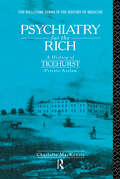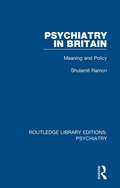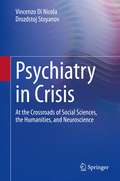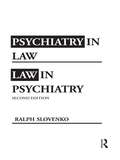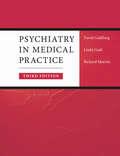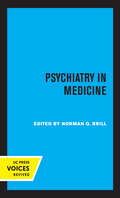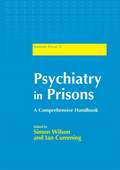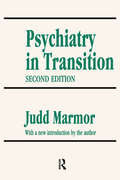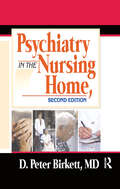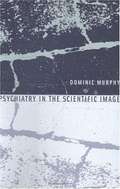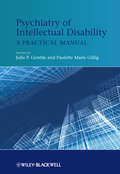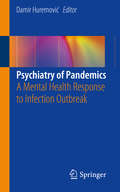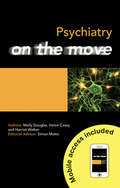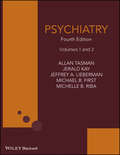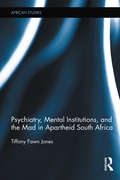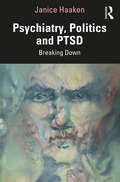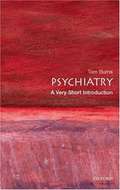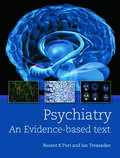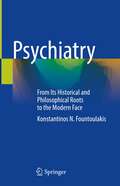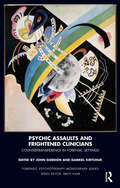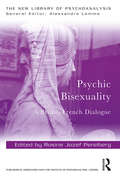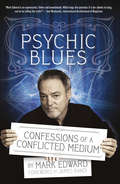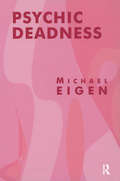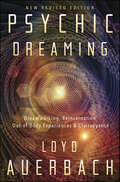- Table View
- List View
Psychiatry for the Rich: A History of Ticehurst Private Asylum 1792-1917 (Wellcome Institute Series In The History Ser.)
by Charlotte MacKenzieThe madhouse often figures prominently in popular conceptions of the nineteenth century, yet little is known about the realities of private institutions. In Psychiatry for the Rich, Charlotte MacKenzie examines the history of the asylum at Ticehurst in Sussex to explore the social history of madness and the impact of politics and popular opinion. She details the backgrounds of the patients, their own descriptions of the asylum as well as changes in the institution through the lunacy reforms and developments in medical theory. Challenging many of the accepted views of the Victorian asylum, Money, Medicine and Madness is the most revealing account of the trade in lunacy in the nineteenth century.
Psychiatry in Britain: Meaning and Policy (Routledge Library Editions: Psychiatry #18)
by Shulamit RamonOriginally published in 1985, this book focuses on British psychiatric policies, particularly in the 1920s, and 1950s when the main legislation concerning mental illness was passed. It approaches policy primarily as the outcome of the relationship between politicians’ attitudes and those of professional groups in a specific social context. It examines the beliefs and theories of psychiatrists, nurses, psychologists and social workers, as well as the attitudes of government and MPs to mental illness, related services and its role in society. It is argued that the adherence to a medical-somatic view of mental illness by psychiatrists and politicians alike has led to the exclusion of viable alternatives, despite lip service being paid to some of them. It is shown that the issues of recent decades have important messages today, particularly in view of the 1982 amendments to the Mental Health Act and the debate about community services.
Psychiatry in Crisis: At the Crossroads of Social Sciences, the Humanities, and Neuroscience
by Vincenzo Di Nicola Drozdstoj StoyanovThe field of academic psychiatry is in crisis, everywhere. It is not merely a health crisis of resource scarcity or distribution, competing claims and practice models, or level of development from one country to another, but a deeper, more fundamental crisis about the very definition and the theoretical basis of psychiatry. The kinds of questions that represent this crisis include whether psychiatry is a social science (like psychology or anthropology), whether it is better understood as part of the humanities (like philosophy, history, and literature), or if the future of psychiatry is best assured as a branch of medicine (based on genetics and neuroscience)? In fact, the question often debated since the beginning of modern psychiatry concerns the biomedical model so that part of psychiatry’s perpetual self-questioning is to what extent it is or is not a branch of medicine. This unique and bold volume offers a representative and critical survey of the history of modern psychiatry with deeply informed transdisciplinary readings of the literature and practices of the field by two professors of psychiatry who are active in practice and engaged in research and have dual training in scientific psychiatry and philosophy. In alternating chapters presenting contrasting arguments for the future of psychiatry, the two authors conclude with a dialogue between them to flesh out the theoretical, research, and practical implications of psychiatry’s current crisis, outlining areas of divergence, consensus, and fruitful collaborations to revision psychiatry today. The volume is scrupulously documented but written in accessible language with capsule summaries of key areas of theory, research, and practice for the student and practitioner alike in the social and human sciences and in medicine, psychiatry, and the neurosciences.
Psychiatry in Law / Law in Psychiatry, Second Edition
by Ralph SlovenkoPsychiatry in Law/Law in Psychiatry, 2nd Edition, is a sweeping, up-to-date examination of the infiltration of psychiatry into law and the growing intervention of law into psychiatry. Unmatched in breadth and coverage, and thoroughly updated from the first edition, this comprehensive text and reference is an essential resource for psychiatry residents, law students, and practitioners alike.
Psychiatry in Medical Practice
by Linda Gask Prof David Goldberg Richard MorrissThis fully updated third edition of Psychiatry in Medical Practice takes into account major changes in medical education since 1994. New sections provide information on problem-based learning and observed structured clinical examinations. Divided into four sections, this book covers: clinical approaches to the patient syndromes of disorder disorders related to stages of the life cycle services, ethics and the law. As well as retaining the key features of the previous editions, this book includes two brand new chapters on risk assessment and the Mental Health Service. A handy portable reference card is also included; this has been updated to incorporate a scale for assessing cerebral impairment in the elderly, and a new assessment of suicidal risk scale. This highly practical book is an essential guide for all medical students and doctors in training who are involved with psychiatry. It is also a useful reference tool for those who are more experienced in the field.
Psychiatry in Medicine
by Norman Q. BrillThis title is part of UC Press's Voices Revived program, which commemorates University of California Press’s mission to seek out and cultivate the brightest minds and give them voice, reach, and impact. Drawing on a backlist dating to 1893, Voices Revived makes high-quality, peer-reviewed scholarship accessible once again using print-on-demand technology. This title was originally published in 1962.
Psychiatry in Transition
by Judd MarmorWhen the first edition of Psychiatry in Transition came out, Dr. Gene Usdin wrote that "to read Marmor's papers is to read not only psychiatric history, but also where that history will be in the next decade." That next decade has happened, and Marmor's papers remain a beacon of professional endeavor. This second edition includes a final chapter on "Short-Term Dynamic Psychotherapy," in which the historical background of brief psychotherapy, focusing on the contributions of Freud, Ferenczi, Rand, and Alexander, is examined and synthesized. Throughout, certain basic themes stand out. First is the necessity for building upon a solid foundation of scientific thought, coupled with a readiness to change theories that do not fit with established facts. Second, Marmor offers a systems theory to replace simplistic, unitary, or linear theories. Third, he presents some common denominators for illuminating the divergent views that characterize contemporary psychiatric theory and practice. The whole is linked by a deep concern with betterment of the human predicament. Marmor demonstrates that causation in psychiatry can be optimally understood in terms of multiple interacting variables rather than as a response to unitary factors. He foreshadows and predicts developments that are now current in contemporary psychiatric practice, such as the relationship between neurochemistry and behavior, and group therapy with dynamic psychotherapy. He also deals with the importance of cultural and socioeconomic factors in individual personality development. The work concludes with a series of chapters on interethnic hostility, nationalism, and urban violence. Marmor's work clarifies the nature of the psychoanalytic process by liberating it from obscurantism and jargon. This book points the way toward unraveling some of the cognitive dissonance in this area. As Leon Eisenberg observed, this is "an admirable vade mecum of dynamic psychiatry both for residents in training and clinicians in practice."
Psychiatry in the British Army in the Second World War (Routledge Library Editions: Psychiatry #1)
by Robert H. AhrenfeldtOriginally published in 1958, this account of the work of psychiatrists in the British Army during the Second World War is based on the study of all available documents, published and unpublished, as well as on the author’s first-hand experience of the clinical and administrative aspects of Army psychiatry. It deals not only with the wartime problems presented by the high incidence of mental illness, and the large numbers of mentally backward and maladjusted men (as they were termed then) in the Service, but also with the methods developed for the selection and efficient use of personnel and officers in the face of acute shortage of man-power; the psychiatric aspects of discipline, morale, training and prolonged service overseas; the treatment and evacuation of psychiatric battle casualties in the forward areas, under difficult and varied conditions; the rehabilitation of disabled ex-servicemen, and the civil resettlement of repatriated prisoners of war.
Psychiatry in the Nursing Home: Assessment, Evaluation, And Intervention
by D. Peter BirkettGet the vital clinical information you need with this comprehensive handbook!In the decade since the first edition of this book, dramatic changes have taken place in the field of geriatric psychiatry. Psychiatry in the Nursing Home, Second Edition, presents timely information on the newest trends in law, culture, and medications, while still offering essential advice on the fundamental concerns of caring for elderly patients with mental illnesses. The new edition of this essential handbook presents up-to-date information on psychiatric issues involving nursing home patients. Featuring helpful case histories and diagnostic criteria, Psychiatry in the Nursing Home, Second Edition, helps you effectively treat such difficult problems as noisy patients, sexual acting out, and incontinence. In addition, it offers help with such administrative concerns as financial issues, absent or warring families, and staffing problems. Psychiatry in the Nursing Home, Second Edition, presents incisive discussions of the changes in the field since the publication of the first edition, including: the effects of the new Prospective Payment System the use of newly released psychotropic medications the altered nomenclature of the DSM-IV the rise in assisted-living facilities the rapid development of the specialty of geriatric psychiatry With its comprehensive scope and practical advice, Psychiatry in the Nursing Home, Second Edition, is a must-have for nursing-home administrators and staff. Policymakers, mental health professionals, and geriatricians will be fascinated by the book&’s wider considerations of the problems of housing and caring for the mentally ill and its provocative suggestions for future policy.
Psychiatry in the Scientific Image
by Dominic MurphyIn "Psychiatry in the Scientific Image," Dominic Murphy looks at psychiatry from the viewpoint of analytic philosophy of science, considering three issues: how we should conceive of, classify, and explain mental illness.
Psychiatry of Intellectual Disability
by Julie P. Gentile Paulette Marie GilligPatients with intellectual disability (ID) can benefit from the full range of mental health services. To ensure that psychiatric assessment, diagnosis and treatment interventions are relevant and effective; individuals with ID should be evaluated and treated within the context of their developmental framework. Behavior should be viewed as a form of communication.Individuals with ID often present with behavioral symptoms complicated by limited expressive language skills and undiagnosed medical conditions. Many training programs do not include focused study of individuals with ID, despite the fact that patients with ID will be seen by virtually every mental health practitioner. In this book, the authors present a framework for competent assessment and treatment of psychiatric disorders in individuals with ID.Psychiatry of Intellectual Disability is a resource guide for psychiatrists, nurse practitioners, and other prescribers treating patients with ID. It is a supplemental text for psychiatry residents, medical students, psychology graduate students, psychotherapists, counselors, social workers, behavior support specialists and nurses. To assist the practicing clinician the book includes:Clinical vignettesClinical pearlsCharts for quick referenceIssues concerning medications and poly-pharmacyAltered diagnostic criteria specific for use with individuals with IDThere are no evidence-based principles dedicated to psychotropic medication use in ID, but consensus guidelines address the high prevalence of poly-pharmacy. Altered diagnostic criteria have been published which accommodate less self-report and incorporate collateral information; this book reviews the literature on psychotropic medications, consensus guidelines, and population-specific diagnostic criteria sets.Psychiatry of Intellectual Disability also includes:Interviewing techniques and assessment tips for all levels of communicative ability as well as for nonverbal individualsAssessment of aggression to determine etiology and formulate a treatment planOverview of types of psychotherapy and suggested alterations for each to increase efficacyRelevant legal issues for caregivers and treatment providersThe detective work involved in mental health assessment of individuals with ID is challenging yet rewarding. The highest quality mental health treatment limits hospital days, improves quality of life and often allows individuals to live in the least restrictive environments. Psychiatry of Intellectual Disability is a must have resource for clinicians treating the ID population.
Psychiatry of Pandemics: A Mental Health Response to Infection Outbreak
by Damir HuremovićThis book focuses on how to formulate a mental health response with respect to the unique elements of pandemic outbreaks. Unlike other disaster psychiatry books that isolate aspects of an emergency, this book unifies the clinical aspects of disaster and psychosomatic psychiatry with infectious disease responses at the various levels, making it an excellent resource for tackling each stage of a crisis quickly and thoroughly. The book begins by contextualizing the issues with a historical and infectious disease overview of pandemics ranging from the Spanish flu of 1918, the HIV epidemic, Ebola, Zika, and many other outbreaks. The text acknowledges the new infectious disease challenges presented by climate changes and considers how to implement systems to prepare for these issues from an infection and social psyche perspective. The text then delves into the mental health aspects of these crises, including community and cultural responses, emotional epidemiology, and mental health concerns in the aftermath of a disaster. Finally, the text considers medical responses to situation-specific trauma, including quarantine and isolation-associated trauma, the mental health aspects of immunization and vaccination, survivor mental health, and support for healthcare personnel, thereby providing guidance for some of the most alarming trends facing the medical community.Written by experts in the field, Psychiatry of Pandemics is an excellent resource for infectious disease specialists, psychiatrists, psychologists, immunologists, hospitalists, public health officials, nurses, and medical professionals who may work patients in an infectious disease outbreak.
Psychiatry on the Move (Medicine on the Move)
by Molly Douglas Harriet Walker Helen CaseyThe Medicine on the Move series provides fully flexible access to subjects across the curriculum in a unique combination of print and mobile formats ideal for the busy medical student and junior doctor. No matter what your learning style-whether you are studying a subject for the first time or revisiting it during exam preparation, Medicine on the
Psychiatry, 2 Volume Set: Self-assessment And Review (National Medical Ser.)
by Michael B. First Jeffrey A. Lieberman Allan Tasman Michelle Riba Jerald KayNow in a new Fourth Edition, Psychiatry remains the leading reference on all aspects of the current practice and latest developments in psychiatry.From an international team of recognised expert editors and contributors, Psychiatry provides a truly comprehensive overview of the entire field of psychiatry in 132 chapters across two volumes. It includes two new sections, on psychosomatic medicine and collaborative care, and on emergency psychiatry, and compares Diagnostic and Statistical Manual (DSM-5) and International Classification of Diseases (ICD10) classifications for every psychiatric disorder.Psychiatry, Fourth Edition is an essential reference for psychiatrists in clinical practice and clinical research, residents in training, and for all those involved in the treatment psychiatric disorders.
Psychiatry, Mental Institutions, and the Mad in Apartheid South Africa (African Studies)
by Tiffany Fawn JonesIn the late 1970s, South African mental institutions were plagued with scandals about human rights abuse, and psychiatric practitioners were accused of being agents of the apartheid state. Between 1939 and 1994, some psychiatric practitioners supported the mandate of the racist and heteropatriarchal government and most mental patients were treated abysmally. However, unlike studies worldwide that show that women, homosexuals and minorities were institutionalized in far higher numbers than heterosexual men, Psychiatry, Mental Institutions and the Mad in Apartheid South Africa reveals how in South Africa, per capita, white heterosexual males made up the majority of patients in state institutions. The book therefore challenges the monolithic and omnipotent view of the apartheid government and its mental health policy. While not contesting the belief that human rights abuses occurred within South Africa’s mental health system, Tiffany Fawn Jones argues that the disparity among practitioners and the fluidity of their beliefs, along with the disjointed mental health infrastructure, diffused state control. More importantly, the book shows how patients were also, to a limited extent, able to challenge the constraints of their institutionalization. This volume places the discussions of South Africa’s mental institutions in an international context, highlighting the role that international organizations, such as the Church of Scientology, and political events such as the gay rights movement and the Cold War also played in shaping mental health policy in South Africa.
Psychiatry, Politics and PTSD: Breaking Down
by Janice HaakenIntegrating critical and feminist psychology, psychiatry, and psychoanalysis, this text offers a distinct perspective of posttraumatic stress disorder (PTSD) as a clinical and social phenomenon. The book draws upon interviews carried out in field settings to examine the true individual and social costs of being diagnosed with PTSD. The author examines how social contexts and social movements shape diagnostic thinking about mental trauma and how the PTSD diagnosis emerged as a symptom of a crisis in psychiatry over demands to recognize the social and political origins of mental suffering. Chapters explore case examples from a range of settings, such as military and veterans' affairs clinics, war zones and refugee camps, psychosomatic medicine, the criminal justice system, and more. Providing a new way of thinking about PTSD and an alternative to both critics and defenders of the diagnosis, this text will be useful for scholars and practitioners in psychiatry, psychology, psychoanalysis, public health policy as well as, sociology, social work, gender studies, and the law.
Psychiatry: A Very Short Introduction
by Tom BurnsPsychiatry is increasingly a part of everyday life. The growing number of patients being diagnosed with depression, ADD, alcoholism, and other illnesses mean that few people are not touched by it. This book provides a valuable and comprehensible introduction to the subject. It starts with the history of its development as a scientific field, including the identification of major mental illnesses, the rise and fall of the asylum system, and the flourishing of psychoanalysis and other psychotherapies. More than any other branch of medicine, psychiatry has been attacked and criticized. There is a long list of perceived horrors--patient abuse, bizarre medical experiments, mind-control by evil governments, coercion by maniacal hypnotists. Modern psychiatry brings with it new controversies, such as the perceived over-prescription of antidepressants and behavior modifiers for children and teens, or unchecked marketing power of drug companies. This book does not draw conclusions on these issues, but rather provides the reader with a clear understanding of what psychiatry is, and what it does, so that they can draw their own. It is a great reference for anyone with an interest in mental illness and its treatment, students of psychiatry, medicine, psychology, and history of science, and health professionals.
Psychiatry: An evidence-based text
by Bassant Puri Ian TreasadenSuccinct, user-friendly, thoroughly referenced and prepared by leading experts in the field, this book is the only single textbook you will need to succeed in the Royal College of Psychiatrists' MRCPsych and other related higher examinations. Chapters follow the structure and syllabus of the examination ensuring that you receive the necessary essen
Psychiatry: From Its Historical and Philosophical Roots to the Modern Face
by Konstantinos N. FountoulakisThis book was the end product of life experiences, thoughts and intellectual wanderings of the author, who through his career and for the last twenty years was always serving all the three aspects of a Psychiatrist: He is a clinician, a researcher and an academic teacher. The book includes a comprehensive history of Psychiatry since antiquity and until today, with an emphasis not only on main events but also specifically and with much detail and explanations, on the chain of events that led to a particular development. At the center of this work is the question ‘What is mental illness?’ and ‘Does free will exist?’. These are questions which tantalize Psychiatrists, neuroscientists, psychologists, philosophers, patients and their families and the sensitive and educated lay persons alike. Thus, the book includes a comprehensive review and systematic elaboration on the definition and the concept of mental illness, a detailed discussion on the issue of free will as well as the state of the art of contemporary Psychiatry and the socio-political currents it has provoked.Finally the book includes a description of the academic, social and professional status of Psychiatry and Psychiatrists and a view of future needs and possible developments. A last moment addition was the chapter on conspiracy theories, as a consequence of the experience with the social media and the public response to the COVID-19 outbreak which coincided with the final stage of the preparation of the book. Their study is an excellent opportunity to dig deep into the relation among human psychology, mental health, the society and politics and to swim in intellectually dangerous waters.
Psychic Assaults and Frightened Clinicians: Countertransference in Forensic Settings (The Forensic Psychotherapy Monograph Series)
by John Gordon R. D. Hinshelwood Gabriel Kirtchuk'...a fascinating read for mental health workers regardless of their own theoretical background. Working with disturbed and disturbing individuals in secure settings produces strong feelings, and working with those feelings is undoubtedly an essential part of providing care effectively. This book is likely to challenge readers' understandings of their own actions and reactions.' (Dr Neil Brimblecombe, Director of Mental Health Nursing, Department of Health, and Nurse Director, Tavistock and Portman NHS Trust.)
Psychic Bisexuality: A British-French Dialogue (The New Library of Psychoanalysis)
by Rosine Jozef PerelbergWinner of the American Board & Academy of Psychoanalysis Edited Book Prize for 2019! <P><P>Psychic Bisexuality: A British-French Dialogue clarifies and develops the Freudian conception according to which sexual identity is not reduced to the anatomical difference between the sexes, but is constructed as a psychic bisexuality that is inherent to all human beings. <P><P>The book takes the Freudian project into new grounds of clinical practice and theoretical formulations and contributes to a profound psychoanalytic understanding of sexuality. The object of pychoanalysis is psychosexuality, which is not, in the final analysis, determined by having a male or a female body, but by the unconscious phantasies that are reached après coup through tracing the nuanced interplay of identifications as they are projected, enacted and experienced in the transference and the countertransference in the analytic encounter. <P><P>Drawing on British and French Freudian and post-Freudian traditions, the book explores questions of love, transference and countertransference, sexual identity and gender to set out the latest clinical understanding of bisexuality, and includes chapters from influential French analysts available in English for the first time. Psychic Bisexuality: A British-French Dialogue will appeal to psychoanalysts and psychoanalytic psychotherapists as well as gender studies scholars.
Psychic Blues
by James Randi Mark Edward"Mark Edward is an equivocator, fibber, and mountebank. Which begs the question: if a liar admits to lying, can he be telling the truth? He is a literate, informative, intellectual, a student of the psychology of humans, a foe of those who would defraud the public for personal gain, and as an author and practicing psychic, he is first and foremost an entertainer."--Joel Moskowitz, International Brotherhood of Magicians Mark Edward admits that for years he exploited believers who wished to connect with supernatural ideas and sad family members who missed dead loved ones. Now Edward is a magician who works the Haunted Castle in Hollywood and is also on the editorial board of Skeptic magazine, where he reveals the means of psychic scamsters. This entertaining book is at once a confessional and instructional regarding human belief and those who exploit it. Though Edward believes that most practitioners of the psychic business are out-and-out scam artists, he also counters the skeptic belief that the supernatural is a lie. Both skeptic and skeptical of skepticism, Mark Edward has worked as a 900-number psychic, ghost hunter, and Hollywood Magic Castle medium. He has also worked vigorously to debunk psychic frauds and currently works on the editorial board of Skeptic magazine.
Psychic Deadness
by Michael EigenMany people seek help because they feel dragged down by a sense of inner deadness that persists in an otherwise full and meaningful life. These individuals somehow remain untouched by their own inner experiences; a deadness persists that can cripple their entire life or part of it. This book shows what is involved in enduring and working with psychic deadness in a day-to-day, session-by-session basis.
Psychic Dreaming: Dreamworking, Reincarnation, Out-of-Body Experiences & Clairvoyance
by Loyd AuerbachEveryone is psychic to some degree, but did you know that your abilities can be enhanced while you dream? Psychic Dreaming explores how parapsychology and dreamwork can be combined to boost creativity, improve your decision-making, and heal yourself in body and soul.Parapsychologist Loyd Auerbach shows you how to identify telepathy, clairvoyance, precognition, and other psi experiences as they occur through dreams. Discover dream incubation, lucid dreaming, and symbol interpretation to solve problems, relieve stress, confront your fears, and overcome nightmares. Use your dreams to create psychic connections with your loved ones, and explore other points in time and space to create a complete picture of the person you are, the person you have been, and the person you will be in the future.Praise:"This book provides wonderful insight into the research and methods used by parapsychologists and dreamers. Loyd Auerbach does a remarkable job of telling an interesting story while defining the nature of psi and dreaming."—John G. Kruth, executive director of the Rhine Research Center
